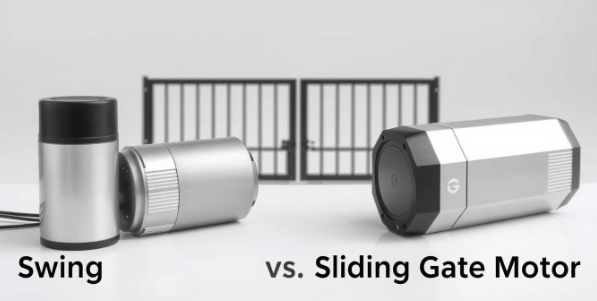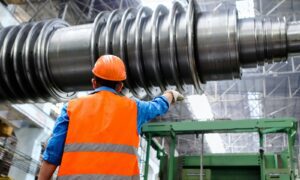Wondering why some properties have swing gates while others have sliding ones? This choice shapes your automatic gate motor installation experience. It affects both functionality and long-term satisfaction.
Choosing between swing and sliding gates is crucial for South African homeowners. Professional gate motor installers stress that this decision impacts installation costs and daily convenience.
Industry expert Yael Sirota highlights that property requirements often dictate gate type. Driveway gate motor installation success depends on space, terrain, and existing infrastructure.
Automated gate system installation offers more than just convenience. It increases property value and enhances home security. These systems are a wise investment for any South African property.
The swing versus sliding decision is vital for homeowners seeking optimal results. Consider your specific needs and consult experts to make the best choice for getting your gate motor installed.
Understanding Swing and Sliding Gate Automation Systems
Gate automation systems offer distinct approaches to property security. Swing and sliding gate motor installations provide reliable security solutions. However, they operate through different mechanisms and have unique operational requirements.
The main difference lies in their movement patterns and structural needs. Choosing between these systems depends on understanding their core operational principles. Each system requires specific installation considerations and maintenance approaches.
How Swing Gate Motors Function
Swing gate motor installation uses hinge-based movement mounted to sturdy posts or walls. The motor creates rotational force to move gate panels. Single swing gates place weight on one post, needing robust foundation work.
The system uses linear actuators or articulated arm mechanisms. These motors must overcome the gate’s weight and wind resistance. Reliable gate motor fitters stress that proper post installation ensures long-term functionality.
How Sliding Gate Motors Operate
Sliding gate systems have two main parts: the track system and the gate. The gate track installation creates a guided path for horizontal gate movement. Motors drive the gate using rack-and-pinion or chain-drive mechanisms.
The track supports the gate’s weight through rollers or wheels. The motor provides lateral movement force. This setup creates different stress patterns compared to swing systems. Gate access control installation requires precise track alignment for smooth operation.
Key Operational Differences
The mechanical differences between these systems affect property owners. Swing gates open inward or outward, with outward opening posing safety risks. Sliding gates move sideways along walls or fences, needing parallel clearance space.
| Feature | Swing Gates | Sliding Gates |
| Movement Pattern | Rotational arc | Linear horizontal |
| Weight Support | Post-mounted hinges | Track-based rollers |
| Installation Complexity | Moderate | Higher calibration needs |
| Space Requirements | Swing clearance | Parallel track space |
The choice between swing and sliding automation fundamentally depends on your property’s physical constraints and security requirements.
Comprehensive Comparison: Gate Motor Installed on Different Gate Types
Choosing between swing and sliding gate motors is a crucial decision for property owners. Each option has unique advantages and limitations.
Your choice affects immediate costs and long-term satisfaction with your automated gate system, especially when considering factors like the Centurion gate motor price, which can vary depending on the model and installation requirements.
Space Requirements and Property Suitability
Space requirements are vital for successful gate automation. Different gate types need varying amounts of space. They also present unique challenges for South African properties.
Swing Gate Space Needs
Swing gates need clearance space equal to their full width during operation. A 12-foot single swing gate requires 12 feet of unobstructed space.
Double swing gates offer a practical solution for narrower driveways. Each panel only needs half the clearance space. This allows for wide openings in smaller areas.
Sliding Gate Space Considerations
Sliding gates need space equal to their length plus two extra feet. This can be challenging for properties with limited side boundaries.
The electric gate motor setup for sliding systems needs a clear track area. This area must stay free of vehicles and other obstructions.
Installation Costs and Complexity
The automated driveway gates cost varies between swing and sliding systems. Component requirements and installation complexity influence these costs.
Swing Gate Installation Factors
Swing gate systems typically need fewer components. They mainly consist of motors, hinges, and basic controls. This simplicity means lower initial costs and quicker installation.
Standard gate operator installation for swing systems often takes just one day. This minimises disruption to your daily routine.
Sliding Gate Installation Requirements
Sliding systems need extra components like tracks, rollers, and complex motor assemblies. Installation requires precise engineering and calibration. This extends project timelines considerably.
Contractors must ensure proper track alignment and motor positioning. This makes sliding gate automation kits installation more labour-intensive than swing gates.
Security and Durability Features
Security is crucial in South African gate selection. Robust protection is paramount for homeowners.
Sliding gates offer better resistance to forced entry attempts. Their track-mounted design and distributed weight make them harder to ram open.
Secure gate motor solutions for sliding systems provide enhanced deterrent value. Their substantial appearance suggests sophisticated security measures to potential intruders.
“The psychological impact of a well-installed sliding gate cannot be underestimated in crime prevention strategies.”
Power Consumption and Maintenance
Long-term operational costs significantly influence the total ownership experience of automated gates. Swing gates are more efficient in gate motor maintenance due to fewer moving parts.
Sliding gates need more intensive maintenance. This includes regular track cleaning and roller inspection for smooth operation.
| Maintenance Aspect | Swing Gates | Sliding Gates | Frequency |
| Track Cleaning | Not Required | Essential | Monthly |
| Hinge Lubrication | Required | Not Applicable | Quarterly |
| Roller Inspection | Not Required | Critical | Bi-annually |
| Motor Servicing | Standard | Complex | Annually |
Swing gates typically use less energy per operation cycle. This is due to their lighter operational loads and simpler movement mechanics.
Conclusion
Choosing between swing and sliding gate automation depends on your property’s features and needs. Professional installers stress the importance of proper assessment before deciding. Physical constraints often determine the best option for your gate.
When considering residential gate motor installation, evaluate available space, budget, and maintenance preferences. Both systems offer reliable automation when installed correctly. Expert guidance is valuable, especially for community or industrial projects.
Licensed installers recommend site visits for optimal system selection. These specialists assess factors like driveway slope, clearance, and power requirements. They also handle essential components such as safety beams for complete security.
South African homeowners should research local gate automation companies for the best installation service. Getting multiple quotes helps compare costs while ensuring quality workmanship. Professional consultation provides valuable insights for new setups or repairs.
Investing in proper driveway gate opener installation ensures years of reliable operation. Find experienced installers through local directories or recommendations. Choose experts who understand regional requirements and regulations for your gate motor needs.



































